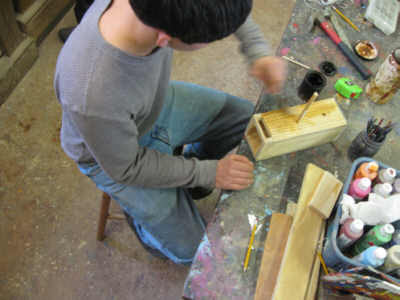Some dictionaries define fixation as an unhealthy preoccupation with something, but looking at it from an educational aspect in the woodshop I refer to it as "intense interest" in the project on hand. When a student becomes fixated on a project it is a beautiful thing to witness as a teacher. When it happens it's as bright in my eyes as is a traffic light turning from red to green then engines roaring at full thrust. The students entire psyche is engaged and he is oblivious to everything except his own focus. It really is that obvious but usually I'm the only one who sees it occur in the woodshop because I maintain my own intense focus on what's going on.
Just recently one of my students was fixated on his project with such intensity that I'm not sure if he would have heard my hands slap together. He did occasionally "come up for air" to ask my advice on a particular problem but his focus was full-throttle on learning how to make the mechanisms on his small box mouse trap work.
Yes, he asked for help but there was no doubt in my mind that he really wanted to master the skills to do it himself. I knew this to be true because after working on the trap for several woodshop periods he asked if he could make another one which leads to the power of repetition. And I'm not talking about the repetition inflicted on me as a child after misbehaving in class, then my teacher telling me to write 100 times, "The true meaning of discipline is not punishment, but the development of enough self control to study, learn, and achieve great things." (I must have written that phrase 10,000 times in elementary school) I'm talking about the kind of repetition that is present when a student wants to learn something new with a passion that can transform their very lives.
Doing something over and over again is probably the most powerful method of learning something new, but when the student is motivated to learn without the teachers constant nudging then he becomes empowered and in control of his own education..."to study, learn, and achieve great things."
With the right motives, prompts, and the ability to engage students imagination with meaningful hands-on activity, good teachers can also reach high levels of student engagement in any classroom setting. Most teachers are good for kids because teaching is a values driven profession but students constantly read you like a book and they know if you're genuine or if you're "just there". That can also be easily applied to parents and grandparents as well so step up to the plate and show a kid how to empower themselves.
Mitered finger joint
-
As part of my ongoing effort to finish unfinished products in my shop, I am
making a box to fit a lid crafted during the filming of my book, The
Taunton C...
5 months ago

















No comments:
Post a Comment